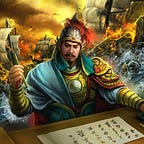The Power of Perception
A person’s perception tells you a lot about them and a lot about how they see the world. Things that might be plain and obvious might be dark and obscure at the same time. Some people have a certain perception that lets them cue into how other people think and perceive. I had an English teacher in my sophomore year of high school that said, “Funny people are smart people because they are smart enough to recognize the obvious things that people find funny. And not everyone is funny.”
Take this photo for example. I just pulled a random photo, and already, I am intrigued by what it could mean. I have so many questions. Where was this photo taken? Why is that blue macaw just perched there? Isn’t it an endangered species? Why is the background so dark? With these questions, I could play around with my imagination, answer the inquiries for myself and create my own story for whatever I see.
Some people have achieved enormous success for their perceptions and have made great works of art with them. Take Ed Ruscha for instance. Ordinary things he saw on his travels, he turned into art. A few words here and there made into art. Odd mediums carry his art. We wonder what he intends with all of his works. They appear plain, but it is his omission of details that so captivates us. We seek answers, but none are provided. So we must make up answers, and we are immensely entertained at our conception of them. In the words of a fellow artist, “You could look at it forever.”
All of this brings us back to the basics. The basics of how people began to think and became sentient and civilized. What we don’t have the answers to, we make up our own based on our prior knowledge. And unfortunately, this is a skill that has deteriorated in recent years. With the Information Revolution and the growing desire for instant gratification, we no longer sit down and ponder. Our heads hurt if we don’t find a quick, predetermined answer. We are losing our humanity.
There needs to be a collective change in thinking, in culture, for us to continue onward. If we are to continue progressing as human beings, we need to resist the pull of instant gratification, and begin the journey to unlocking our own perceptions, and framing our ideas in such a way that everyone can benefit. Ed Ruscha is someone we should emulate in this endeavor.
